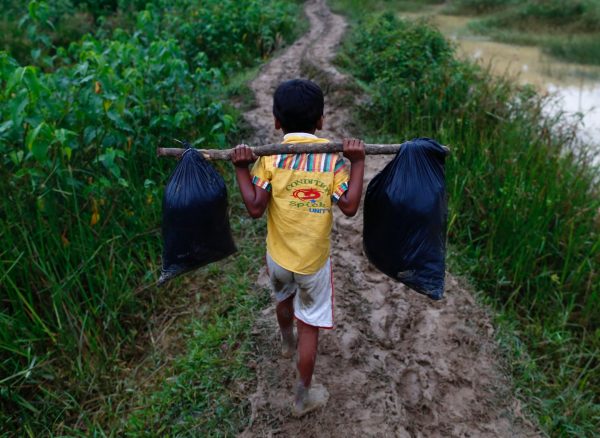Following the 25 August attack on 30 police posts and an army base by the Arakan Rohingya Salvation Army (ARSA), the Burmese military launched a counteroffensive. Since then, over 370,000 Rohingya Muslims have fled across the border to Bangladesh and around 30,000 non-Muslim civilians are internally displaced.
The UN estimates that 1000 men, women and children have died, while Bangladeshi authorities estimate the numbers could exceed 3000. These numbers are likely to rise. Refugee camps in Bangladesh sheltering around 700,000 Rohingya — over half of the entire Rohingya population — are stretched beyond capacity, creating a humanitarian catastrophe in itself.
Global recognition of the urgency of this crisis has grown. On 11 September, the UN High Commissioner for Human Rights called it a ‘textbook example of ethnic cleansing’. Similar to previous periods of violence, Nobel Laureates have appealed to fellow Laureate and State Counsellor Aung San Suu Kyi to defend the rights of the Rohingya. Observers were troubled by her claim that ‘a huge iceberg of misinformation’ was promoting the interests of ‘terrorists’, prompting calls to rescind her Nobel Prize.
High-level attention to this crisis is welcome, but concrete and concerted action is long overdue. The stakes are high — averting genocide, reversing the unravelling of Myanmar’s democratic transition and reducing inflammation of interreligious tensions on a global scale. Over the last few years, scholars have articulated that the risk of genocide is real, as available evidence is compared with the elements of the UN Genocide Convention and with social scientific frameworks of how genocide unfolds.
Some have highlighted how heavy-handed military activity will only strengthen extremism on all sides, as well as the influence of the military in Myanmar’s government — a condition that Myanmar’s people have struggled against for decades.
Violence against and persecution of the Rohingya has led to protests worldwide, including in Muslim societies. A disproportionately weak international response exacerbates global tensions and renders the Rohingya more vulnerable to manipulation by extremist organisations. Until now, according to the International Crisis Group (ICG), ‘Rohingya communities have not typically been radicalised in this fashion and there are no indications that ARSA has been pursuing goals congruent with those of global jihadist outfits’. But as ICG surmises, ‘An alienated, desperate and dispossessed population … is ripe for exploitation by such groups’.
The feeling that we are in a quandary clouds the sense of urgency. It is counterproductive to let this political crisis fester, as deep-seated despair may lead to more violence. As Suu Kyi affirmed in her 2012 Nobel Lecture ‘Wherever suffering is ignored, there will be the seeds of conflict, for suffering degrades and embitters and enrages’. However, some experts argue that it is counterproductive to commit acts of violence against the state, as the military’s hard-line response will lead to atrocities and disaster.
Yet let us also be mindful to see nuance in ‘terrorism’ and desperation, lest we create a logic that would condemn scenarios like armed Jewish resistance to the Nazis’ Final Solution, such as the Warsaw ghetto uprising in 1943.
Finally, some suggest it is counterproductive to attack Suu Kyi, for if she is disempowered, then what hope for resolution is there? Flawed or politically constrained, she still must be part of the solution.
The international community has been watching this train wreck in slow motion for years. It must take responsibility for failing to speak and act sooner to save lives and protect democratic progress and peace.
First, humanitarian imperatives must be de-linked from the slow, hard struggle for a political resolution. Security and access to basic necessities — including food, shelter, health and education — must be guaranteed immediately for victims in Bangladesh and Myanmar. The UN, ASEAN and other foreign governments must dramatically increase resources to these ends. Such initiatives will save lives and deter violence fuelled by despair.
Second, all relevant domestic and international entities should support implementing the recommendations welcomed by the Myanmar government last August in the Final Report of the Advisory Commission on Rakhine State. Headed by former UN secretary-general Kofi Annan, the Commission was set up last year at the request of Suu Kyi. The Final Report is a vehicle through which to strengthen constructive government leadership, foster domestic public support and coordinate efforts in resolving the crisis. It focuses on the grievances of and development for all communities in Rakhine, as well as citizenship and equal rights for the Rohingya.
Diplomatic pressure must be applied through carrots and sticks, including the credible threat of visa bans, asset freezes and reductions in economic and military cooperation. The bilateral relationships of ASEAN members, Western governments and significant trading partners such as China must be scrutinised and reassessed.
As the global history of ethnic violence demonstrates, it is up to everyone — domestically and internationally — to give meaning to ‘Never Again’. As Suu Kyi once said: ‘Ultimately our aim should be to create a world free from the displaced, the homeless and the hopeless … every thought, every word, and every action that adds to the positive and the wholesome is a contribution to peace. Each and every one of us is capable of making such a contribution’.
Katherine G Southwick is Visiting Scholar at George Mason University’s School for Conflict Analysis and Resolution and a Doctoral Candidate at the Faculty of Law, National University of Singapore.

